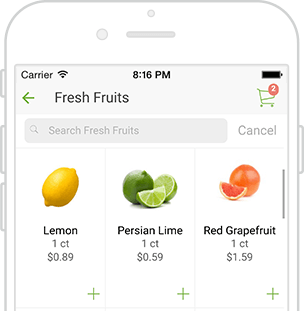Though Instacart may be the most widely known name in tech circles, web-based grocery delivery is still anyone’s game.
 The latest proof comes from Shipt, a Birmingham, Alabama-based grocery delivery service, which announced today that it has raised a $20.1 million Series A round of funding from Greycroft Partners, Harbert Growth Partners and e.ventures.
The latest proof comes from Shipt, a Birmingham, Alabama-based grocery delivery service, which announced today that it has raised a $20.1 million Series A round of funding from Greycroft Partners, Harbert Growth Partners and e.ventures.
Added to prior seed funding, the company has now raised a total of $25.3 million in venture capital.
As simple as any other grocery delivery service, Shipt offers an app (available for Android, iOS, and web) where members can shop among a database of 40,000 groceries, choose delivery options, and submit their order. A membership on Shipt can either be paid annually ($99 per year) or monthly ($14 per month, which would add up to $168 per year). Included in the membership is same-day delivery, though some deliveries can be done in as little as an hour. Deliveries are free for orders over $35.
 In other words, the service is very similar to Instacart Express, Instacart’s grocery delivery membership. As with Shipt, Instacart Express offers free delivery on orders over $35. The difference is that, while Instacart Express started out as a $99 per year membership (same as Shipt), it has since been increased to $149 per year.
In other words, the service is very similar to Instacart Express, Instacart’s grocery delivery membership. As with Shipt, Instacart Express offers free delivery on orders over $35. The difference is that, while Instacart Express started out as a $99 per year membership (same as Shipt), it has since been increased to $149 per year.
“The grocery ecommerce space is an extremely competitive environment but, in spite of the odds, Shipt has reached a dominant position in a short period of time,” said Ian Sigalow, co-founder and partner of Greycroft Partners, in a prepared statement.
Indeed, though web services have attempted to own grocery delivery as far back as the 1990s (when Webvan started up), the newest household name in the space is Instacart, a San Francisco-based company that has raised approximately $275 million and is mostly lately valued at $2 billion.
In spite of the hefty numbers, however, Instacart has shown signs of the sharing economy squeeze. In addition to the increased fee for Instacart Express (as described above), the company has also raised delivery fees, laid off recruiters, and slashed earnings for drivers all in the past year. Each of these provides more evidence that operating a grocery delivery service isn’t as easy as it may sound.
All that said, Shipt appears to be thriving.
The company originally launched in its hometown of Birmingham in 2014, but has since expanded to 27 cities across 10 states. Shipt says it now serves 5,000 shoppers. (If those shoppers are all members, that means the company’s bringing in at least $500,000 per year in membership fees.)
According to today’s announcement, Shipt will use its new funding to ink new partnerships with grocery retailers and expand to additional regions—two areas where Instacart has a head start. Seeing as how both companies seem to have similar offerings, I’ve reached out to Shipt to learn more about how they plan to compete with (and differentiate themselves from) Instacart. I’ll update when I hear back.



















